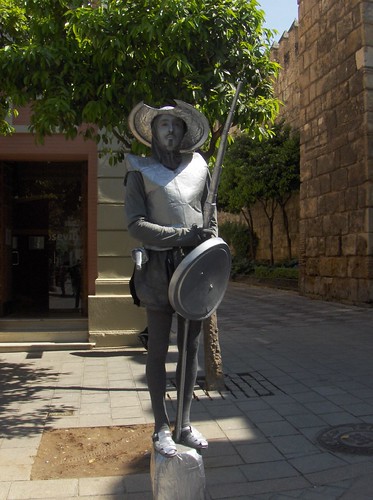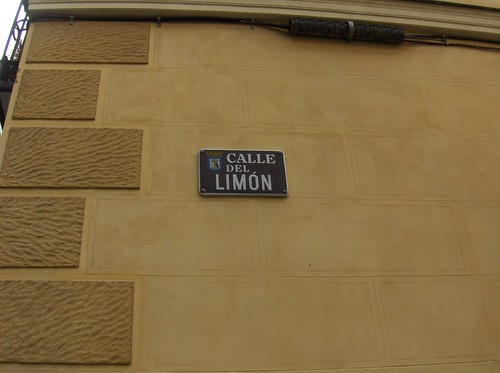Chapter 27.So priest and barber, squire and steed
Head out to save their friend in need
With subterfuge, and some cross-dressing.
Head out to where Don's still professing
His love for Dulz, and for the knightlife,
(Myself, I'd settle for a quiet life.)
They meet Cardenio (from before,
his tale's in Chapter 24).
Chapter 28.Next things get, if not quite dramatic,
At least a bit soap operatic.
I'll simplify, to keep things short,
Though brevity is not Mick's forte.
Forgive me if I stoop to flashback
(I hope you won't be wanting cash back).
Card loved Lucy, thought he'd wed her.
Ferd saw Lucy, thought he'd bed her.
Lucy, distraught, seemed to choose bird in hand,
When she agreed to marry Ferdinand.
Card was distressed, went off his head.
Wished Ferdinand and Lucy dead.
Fled to mountains, rent his garments.
Hung out with sheep, was prey to varmints.
Meanwhile, poor Dot (that's Ferdy's ex),
Is fugitive too, cause back then sex,
Though practiced slyly, with abandon,
Was sanctioned only with a band on.
Needless to say, she's mad at Ferdy,
A trait she shares with our friend Cardy.
Chapter 29Barber and priest meet Card and Dot.
Decide to change and improve plot
To rescue Don. With fair Dot's succor
Hatch a new plan designed to sucker
Don into helping our fair damsel.
No need for priest to dress like mademoiselle;
They've Dot for that. Plan works a treat.
Don falls for story -- very neat.
Chapter 30.Next up in remote mountain pass
They find the thief who stole squire's ass.
Sancho is happy to see Dapple.
Even rewards him with an apple.
Chapter 31.So priest and barber, squire and knight,
and Card and Dot, travel by night
Until at last they reach the inn.
There's rooms for all. They're in like Flynn!
Chapters 32 - 34. They eat. They drink. Don goes to bed.
To rest his sleepy knightly head.
The others read a tale so boring
I can't sum up. It had me snoring.
I'm sorry. I can't. It's just too insanely boring. Please don't make me. Chapter 35.In Don's bedroom, all hell breaks out;
They go to see what it's about.
Find Don in posture of defiance;
He thinks he's being attacked by giants.
Lays waste with sword, starts breaking things;
Before long, punctures inn's wineskins.
Red wine pours out -- a crimson flood,
The Don mistakes it for giants' blood.
They praise and calm befuddled knight
And try to settle in for the night.
Chapter 36.But someone's heard a-knocking outside -
Looks like a nobleman. And his bride?
Well, golly gee! It's Ferd! And Lucy!
Looks like our story's getting juicy!
Remember Ferdy? (he's Dot's ex,
Who dumped her after having thex).
Remember Luce? (Cardenio's flame)
Dressed like a nun! So what's the game?
What happens next? I'll make it quick.
Spare you all of Mick's slick shtick.
Ferdy, who's mistreated both wenches,
Repents, resolves to be a mensch, as
Befits his noble rank and station.
Both pairs unite. Much jubilation!
Card and Lucy get quite sappy.
Dot and Ferdy -- just as happy.





















